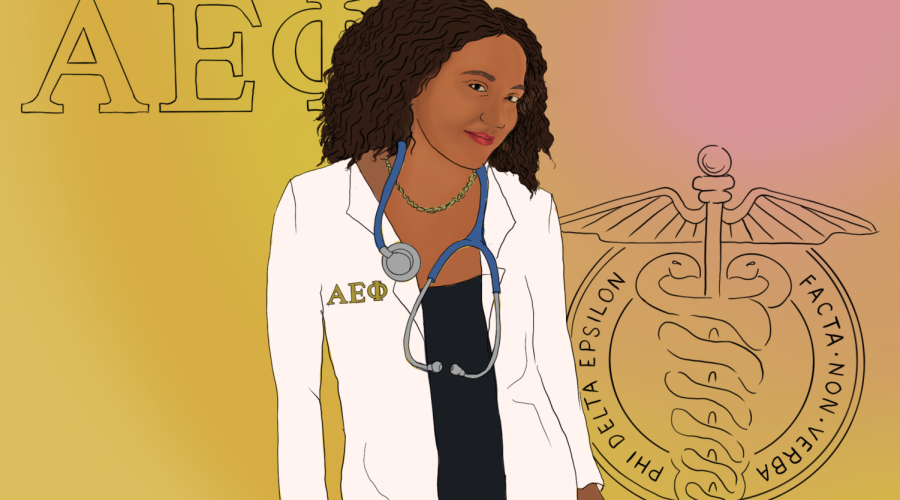When some of my friends who are not a part of Greek life find out that I’m in a sorority at NYU, they’re often shocked. I don’t fit into the stereotypical “sorority girl” look — I’m not blonde and I’m not white. I can almost see their opinions of me changing as they try to wrap their heads around why I’d want to join one. Some even go as far as to admit that if I had shared that I was in a sorority when we initially met, they most likely would not have become friends with me. It’s frustrating how people can be so quick to assume that because you don’t look or act a certain way, Greek life isn’t for you.
I was actually against joining Greek life when I first started at NYU. As a pre-health student, I was convinced that it would just be a distraction from my courses and responsibilities. But by the end of my first month of college, I learned that if you study 24/7 and don’t prioritize your mental health, you’ll get burnt out. This holds true for many students, and being in a social organization where you can take a break from talking about classes or homework is important — and even beneficial — to students’ success.
Still, I had concerns about joining Greek life. I was afraid that my peers, and especially those in my STEM major, would see me as a walking stereotype — a ditzy college girl who only cares about partying. I feared that, from the perspective of a potential employer, being in a sorority might reflect poorly on my work ethic and academic ability. I felt like I would need to prove to them that I was more than that stereotype, in addition to already needing to prove myself as a woman of color in medicine.
As a Black woman in a field that is predominantly white and male, belonging to a historically white, collegiate social organization adds another layer. Greek life has a dark, discriminatory history — I knew that going in. But I also knew that sororities aren’t exactly what they used to be, especially at NYU. The weekend before recruitment began, I attended a women of color panel hosted by the Panhellenic Council, the governing body of NYU’s sorority life. Seeing other women of color speak about their experiences made me realize that Greek life could actually be for me. A week later, I participated in recruitment and ended up joining Alpha Epsilon Phi.
The December after I was initiated into my sorority, I ran for and was selected to be the Diversity, Equity, and Inclusion chair of my chapter, a new position established that semester. I wanted to change the little interest that many Greek life members felt towards DEI initiatives in the past, so I worked to create engaging events and encourage involvement across all chapters. I implemented a required training session for new members of my chapter by addressing their innate biases and discussing how to be anti-racist. I ran for the chair of the the Panhellenic Council the following year, where I continued holding anti-bias training for recruiters and prospective members across all seven sororities.
The history of Greek life is not something to be sugar-coated or spoken about in hushed tones. In fact, Alpha Epsilon Phi was created by seven Jewish women at Barnard College who hadn’t been permitted to join other organizations. While the sorority was founded as a result of discrimination against the Jewish community, the chapter has since welcomed thousands of women from all walks of life and is continuing to do so. And now, all members who want to participate in recruitment and potential new members must undergo a diversity and inclusion training session.
It was a full-circle moment for me this year when I was able to plan and host the same women of color panel that brought me to Greek life two years ago. It was incredible to see so many women of color in the audience interested in joining, while also listening to the experiences of current members of color. Holding this position has had a huge impact on my experience in a sorority — it allows me to express a huge part of my identity by working on initiatives that I’m extremely passionate about.
I am also a member of another organization in Greek life — Phi Delta Epsilon, the co-ed medical fraternity at NYU — that has introduced me to people in my classes who have similar majors and the same goals of becoming medical professionals. Being a member of Phi Delta Epsilon is a way for me to honor my identity as a pre-health student, just as being a member of Alpha Epsilon Phi is a way for me to express the side of me that enjoys time away from my textbooks.
At the same time, I have found it difficult to manage all of my responsibilities as a pre-health student and member of Alpha Epsilon Phi, and I have had to make sacrifices in order to remain a part of both. Attending required meetings and sisterhood events during the week is challenging when you have a lab report due the next day, a quiz to study for and a midterms season that seems to last all semester long.
But then comes one of the greatest aspects of being in a sorority — sisterhood. My friendships with the other members of Alpha Epsilon Phi have provided me with no shortage of study buddies to help me through grueling review sessions or just a regular Tuesday night workload. Being a part of my sorority has also introduced me to amazing people in other NYU sororities that I may have never met through classes.
Greek life at NYU is quite small in comparison to the student body, so it can be extremely hard to find other members who are also pre-health — but it’s not impossible. Trying to pursue a degree in such a competitive field where you see students frequently dropping out can be a daunting reality, so having friends who support you both inside and outside of the classroom is such an amazing feeling.
I’ve learned to simply stand up for myself and not feel ashamed for joining an organization that is not traditionally meant for people like me. I walk into my organic chemistry lab wearing “AEPhi” proudly across my sweatshirt, and guess what? It has zero effect on the success of my experiment or on my ability as a student. If my classmates think otherwise, then that is an issue they must reconcile with, not me.
Contact Elleni Solomon at [email protected].

























































































































































